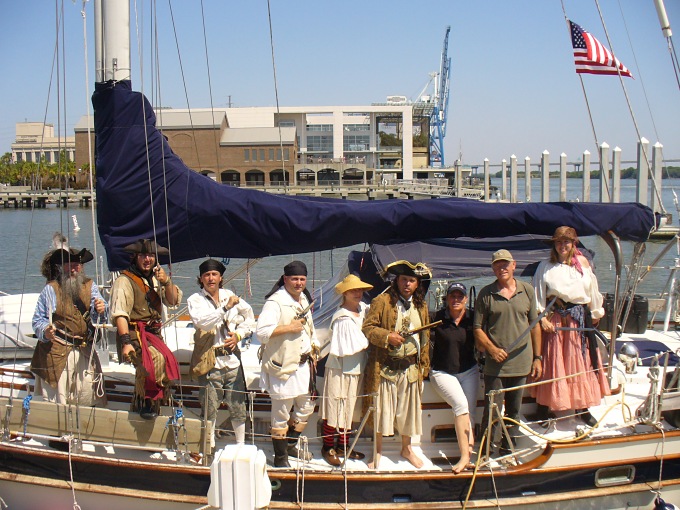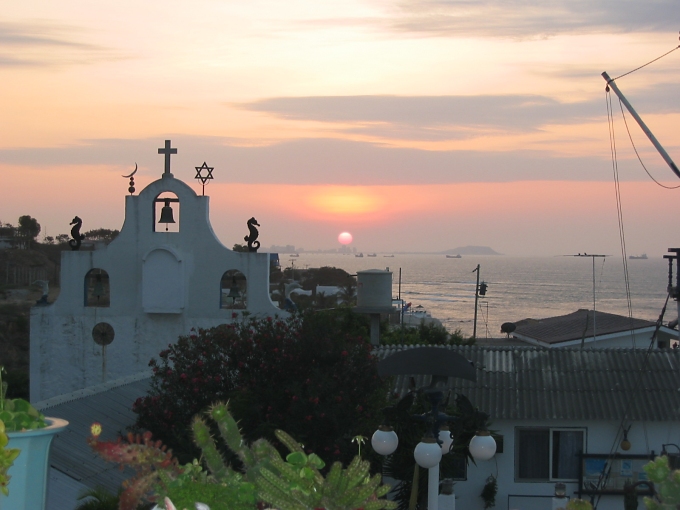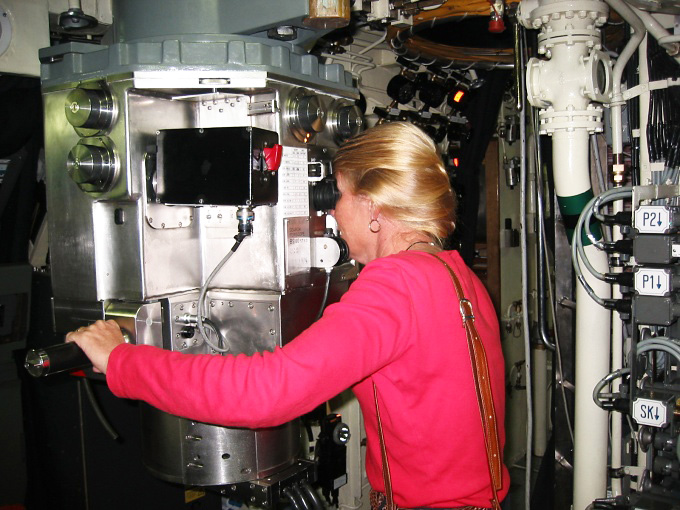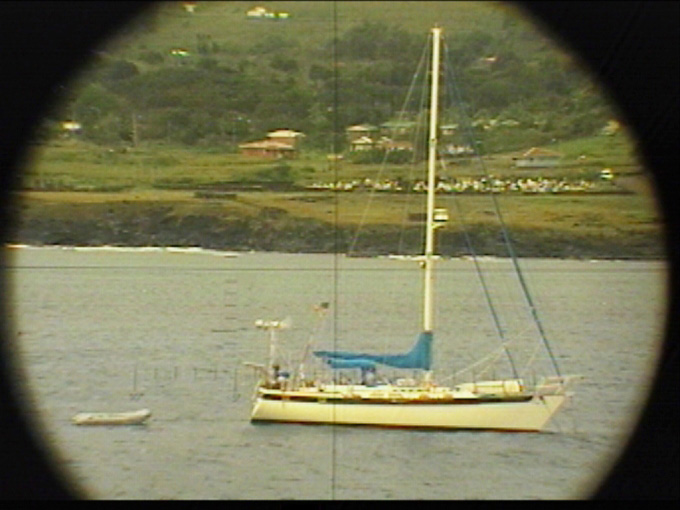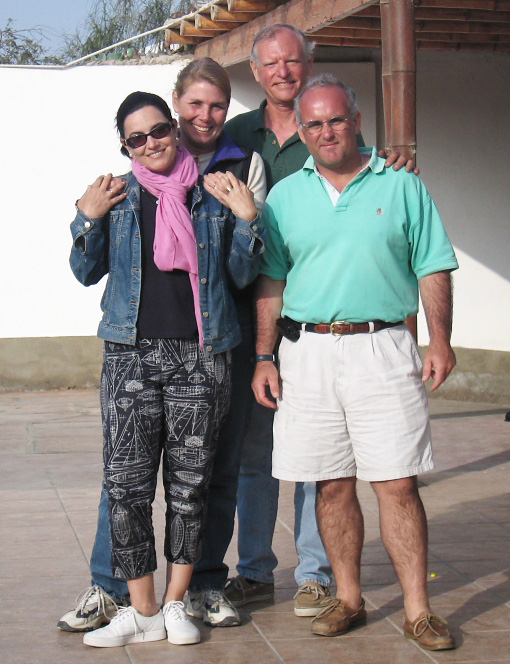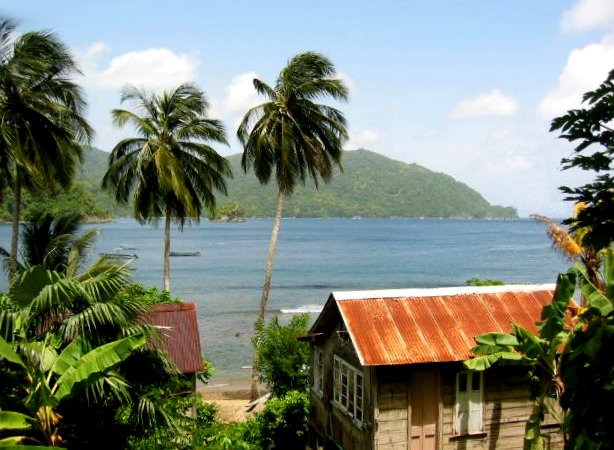The 90-day rule...part 2
/We've been invited to innumerable people's homes for dinner. Absolute strangers have loaned us their cars. People have taken us under their wings, given us fruit and veggies from their gardens, gone the extra mile and made us part of their families during our stay. In Arica, Chile, a Coast Guard petty officer let us tie up our dinghy to his launch to keep it safe. He also watched our boat while we went on an overnight inland tour. On his day off, he showed us around the city, took us to the market, carted us up to the museum and observatory at the top of El Morro headland for the most outstanding views of the port below and then brought us home for dinner. He gave David a Chilean Coast Guard cap as a memento of our meeting and friendship. All because he just wanted to get to know some Americans. We've stayed in touch.
While hauled out in Uruguay, a couple wandered through the boatyard admiring boats. They spoke only Spanish, but we communicated just fine. They were both retired physicians and now owned and managed a vineyard. Would we like to visit their vineyard? They picked us up and drove us the three hours there and back. We had a private tour of their vineyard and then a gourmet luncheon served at their bodega, sampling their fine wines. We later visited with them at their apartment in Montevideo and in Punta del Este. When we left, Martha made a special trip to the marina to bring us a case of their reserve wine. How can you repay such generosity?
 Perhaps we draw more attention when we travel to places that others seldom visit. When we were leaving Uruguay for South Africa with hopes of stopping at Tristan da Cunha, a tiny, isolated South Atlantic island, we sent an email in advance asking if we could possibly bring anything that they needed. There is no airport and their only conveyance and source of supplies is by infrequent ship. We received no less than five e-mails in the next day or two. The school, the hospital, the doctor, the administrator and the communications officer all responded that nothing was needed, but we were very welcome to Tristan. If the weather allowed, we planned to stop there.
Perhaps we draw more attention when we travel to places that others seldom visit. When we were leaving Uruguay for South Africa with hopes of stopping at Tristan da Cunha, a tiny, isolated South Atlantic island, we sent an email in advance asking if we could possibly bring anything that they needed. There is no airport and their only conveyance and source of supplies is by infrequent ship. We received no less than five e-mails in the next day or two. The school, the hospital, the doctor, the administrator and the communications officer all responded that nothing was needed, but we were very welcome to Tristan. If the weather allowed, we planned to stop there.
One fellow, Andy, who is still the island's communication officer, kept track of us for the entire trip with daily emails and/or radio chats. The weather cooperated and we managed to get ashore each of two days. Andy was waiting for us on the dock when we arrived. He drove us on all seven miles of paved road on the island to the Patches (local potato growing area), opened the little museum for us, took us home for lunch each day. When we left, he filled our freezer with Tristan lobsters and Tristan lamb. Our larder was full of Tristan spuds. We stay in touch to this day and would love the opportunity to return for a longer stay. Andy, by the way, knew the communications officer at St. Helena so when we stopped at this lovely island on our way back across the Atlantic, Gilbert was there to meet and greet us. Again, unbounded hospitality was shown to us. We visited parts of the island with a native Saint and saw things that off-islanders seldom see.
 Our trip from South Africa to Charleston, SC was 73 days. Though we stopped at St. Helena and Ascension Islands, it was still a long, long trip to Charleston on the diagonal across the Atlantic. To put it into perspective, we left Cape Town in February and arrived in Charleston around Mother's Day. We were tired as we tied up at the Charleston Maritime Center right in the heart of downtown Charleston. We'd spent quite a bit of time here in past years and the same crew was on hand to welcome our return. We noted the marina had many empty berths and it wasn't until a few days later that we learned the Tall Ships were heading into Charleston and the marina needed to be vacated to accommodate their arrival. The entire marina...except us! An extra berth opened up and since we'd traveled for so far and so long, they made it available to us. In the midst of all of these majestic tallships, Nine of Cups, a definite “short ship” sat comfortably in her berth. We even had a staged pirate boarding of Cups to the delight of the crowd and us.
Our trip from South Africa to Charleston, SC was 73 days. Though we stopped at St. Helena and Ascension Islands, it was still a long, long trip to Charleston on the diagonal across the Atlantic. To put it into perspective, we left Cape Town in February and arrived in Charleston around Mother's Day. We were tired as we tied up at the Charleston Maritime Center right in the heart of downtown Charleston. We'd spent quite a bit of time here in past years and the same crew was on hand to welcome our return. We noted the marina had many empty berths and it wasn't until a few days later that we learned the Tall Ships were heading into Charleston and the marina needed to be vacated to accommodate their arrival. The entire marina...except us! An extra berth opened up and since we'd traveled for so far and so long, they made it available to us. In the midst of all of these majestic tallships, Nine of Cups, a definite “short ship” sat comfortably in her berth. We even had a staged pirate boarding of Cups to the delight of the crowd and us.
To be continued...


